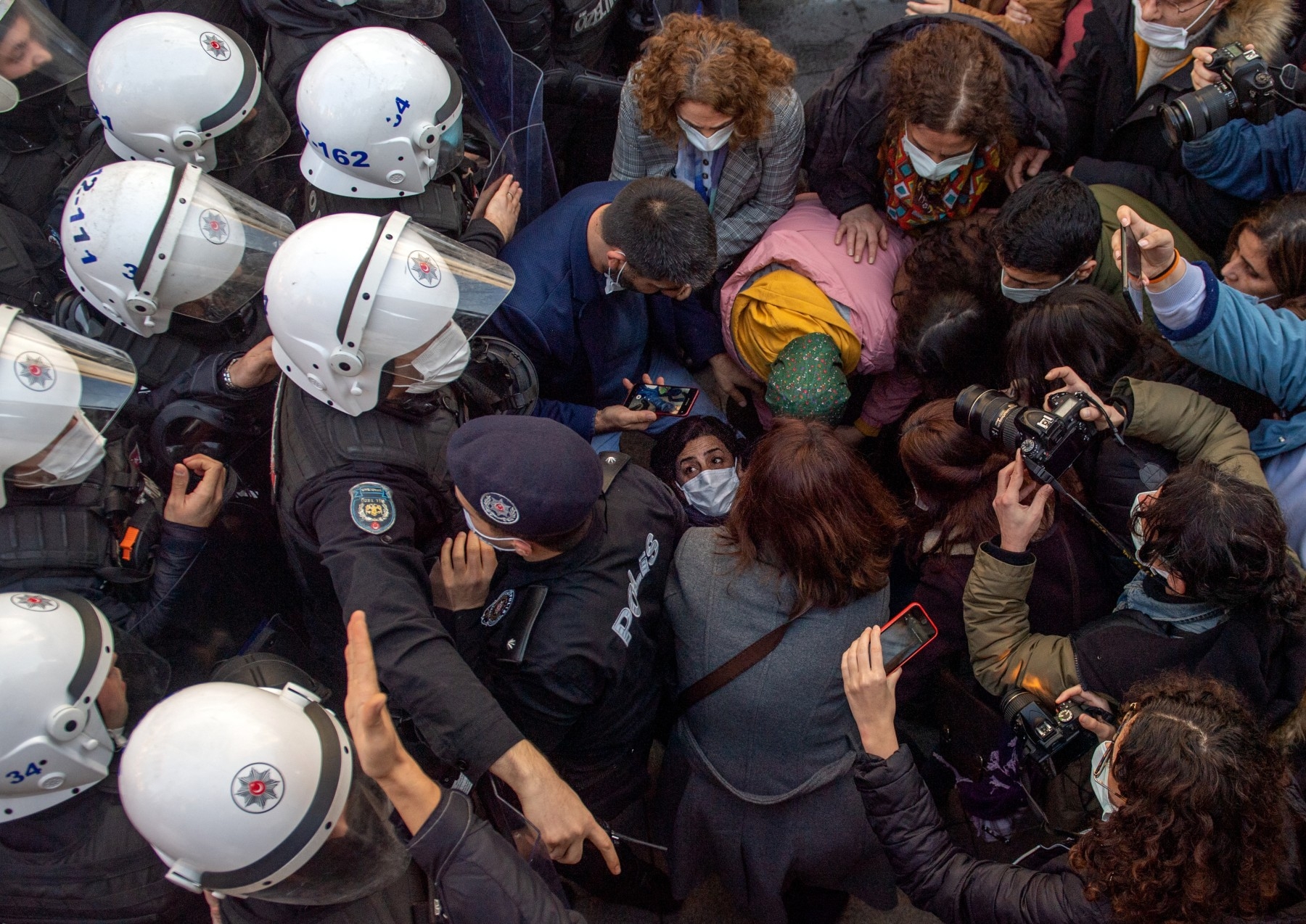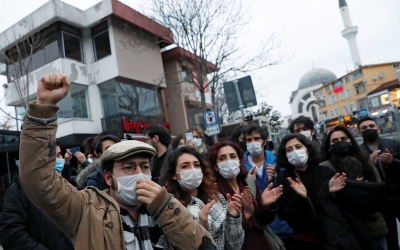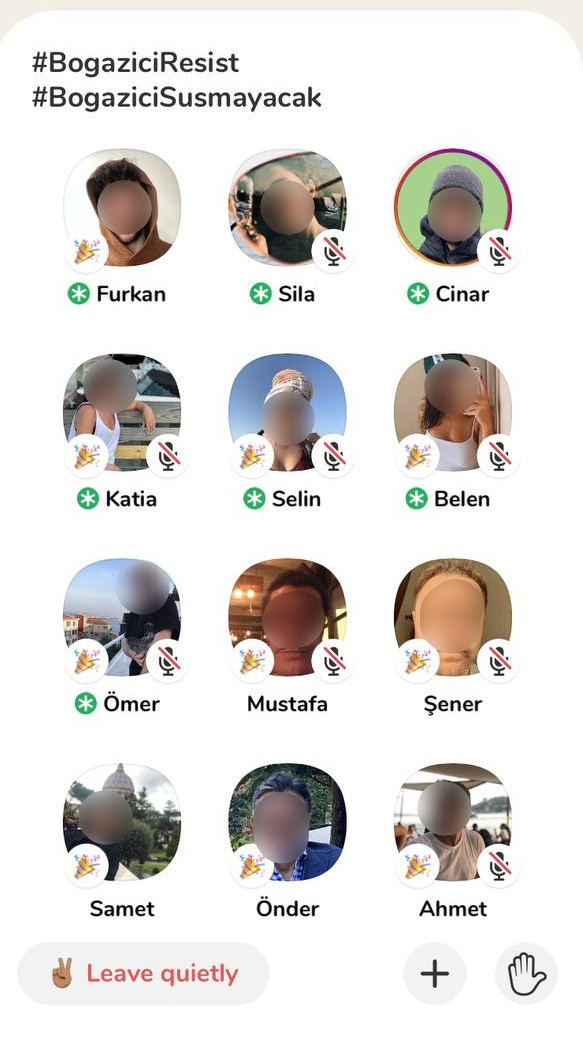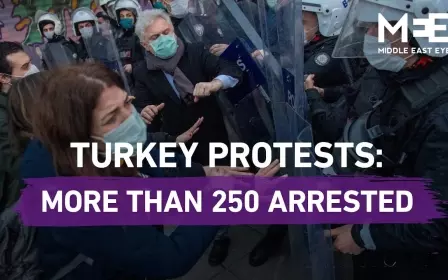New app Clubhouse becomes free speech haven in Turkey amid Bogazici protests

When Turkish police surrounded Bogazici University earlier this month, it issued a warning. Remove the blockade on the rector’s office or face arrest. It looked like the end was near - yet people all over the country had their eyes peeled on the demonstrations, looking for more information than traditional media could give them.
That's when Clubhouse came in.
Students have been protesting for around a month against the appointment of ruling party loyalist Melih Bulu as rector by President Recep Tayyip Erdogan, calling it undemocratic, since Bulu is the first rector to be appointed from outside a university since a military coup in 1980.
While protesters have used YouTube, Twitter and other social media platforms, they have also begun using something novel to disseminate their messages: new audio-only social media app Clubhouse.

In less than an hour, a chat group consisting of 5,000 people gathered and started to transmit live information from the ground. Those listening could hear in real-time about the police raid and arrests.
Similar chat groups broadcast for hours, some continuously for more than a day, quickly becoming a centre of activism as users asked for tents, blankets, food and other necessities.
Furkan Dabaniyasti, a moderator one of the most popular Bogazici Clubhouse rooms, said that interest in the debate was on par with South African billionaire Elon Musk’s popular appearances on the app.
“We have gathered every component of the university, from students and alumnus to academics in an open forum where they discuss everything openly and publicly,” Dabaniyasti said. “We support the academic resistance and hold debates on the new actions that could be taken.”
While there isn’t any solid data, Turks have flocked to Clubhouse since January, with the app staying at the top of the "most downloaded" social media apps list on the Apple Store for the last two weeks.
Young, educated, urban Turks
Turkish users include famous musicians, such as rapper Ezhel, as well as journalists and influencers with millions of followers. Users are predominately white-collar, educated, young, urban Turks, who discuss everything from sex to politics to cryptocurrency in open chat groups they can drop in and out of instantly.
The US app had a quick rise and a subsequent fall in China as well, where thousands of mainland Chinese citizens had an uncensored discussion on sensitive issues such as Beijing’s treatment of Uighur Muslims, and the situations in Taiwan and Hong Kong. Authorities quickly blocked access to the platform in China this week.
All people interviewed by Middle East Eye point out that the app provides a platform where everyone can exercise free speech and have meaningful conversation with individuals with whom they wouldn’t normally interact.
For digital media expert Yalcin Ari, current polarisation in Turkey has helped Clubhouse’s rise.
“Of course it allows people to come together en masse and talk about issues, something that wasn’t possible since the coronavirus pandemic broke out," he said.
“More importantly, it helped people who wouldn’t talk to each other due to the polarisation produced by the political events of the past seven years. They listen to each other and see that there is a common ground that could bridge differences.
"Clubhouse somehow makes one more tolerant, because you face the people you would usually ignore or block on social media.”
Some users have utilised the chat group feature to create "shows", with designated speakers and co-hosts talking about specific topics.
“It somehow democratises the whole debate, because individuals with fewer or no followers have an equal voice with some of the most famous journalists in the country in a chat room,” Ari said.
Dabaniyasti, the alumnus moderator, believes that the Bogazici chat room serves as a resource for accurate information on the protests.
“It also helped Bogazici students to express themselves better with the attendance of journalists, lawyers and politicians," he said.
Turkey has a notoriously poor record of press freedom, with its media overwhelmingly controlled by government-affiliated companies. Newspapers and news channels mostly operate as echo chambers that feed the same talking points.
Politicians seize on momentum
Meanwhile, social media platforms such as Twitter and Facebook are prone to be manipulated by interest groups through mass fake accounts. But Clubhouse seems so far to have removed some of these obstacles, with some viewing the app as having the potential to become a news source in its own right.
Caglar Cilara, a TV journalist who now broadcasts on YouTube, said that the app has encouraged him to talk to people he wouldn’t normally engage with.
Gulcin Avsar, a lawyer and one of the founding members of liberal opposition party Deva, said she used Clubhouse as a direct news propagation tool from the police station after Bogazici students had been taken away by security forces.
'I transmitted every bit of information I had on the detained students. It surely stopped unfounded rumours'
- Gulcin Avsar, lawyer
“I transmitted every bit of information I had on the detained students. It surely stopped unfounded rumours," she said. "For example, some people falsely claimed that a student had a cerebral haemorrhage, when actually there wasn’t anyone hospitalised.”
Politicians have also quickly seized on the momentum.
Former Turkish Prime Minister Ahmet Davutoglu engaged with a group of 2,000 Clubhouse users earlier this month and candidly responded to questions. Canan Kaftancioglu, one of the heavyweights from the main opposition party CHP, has been actively joining political conversations.
Ruling party officials also haven't shied away. Several ministers, including Industry Minister Mustafa Varank, showed up and had debates with users.
The ruling AK Party's deputy chairman, Mahir Unal, was also online for a few hours, in which he revealed that talks between the Turkish government and Twitter were underway to get the US company to assign a legal representative to Ankara under a new social media law.
Ari said Clubhouse chatrooms have helped to break the walls built by the government-aligned media.
“This could help civil society to better organise and express itself on the issues that matter for the general public,” he said.
Middle East Eye delivers independent and unrivalled coverage and analysis of the Middle East, North Africa and beyond. To learn more about republishing this content and the associated fees, please fill out this form. More about MEE can be found here.





